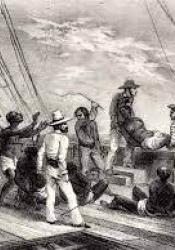The Zong Massacre and Slavery Abolishment
In the Romantic period, which lasted from 1780-1837, slavery was a common thing among the nation of Europe. Amid this period, anti-slavery was able to arise towards the early 1800’s by many activists had great success in accomplishing their goals, helping abolish slavery. Before the abolishment happened, Britain was responsible for transporting millions of enslaved Africans across the Atlantic Ocean and being heavily involved with slavery.
In the fall of 1781, Caption Luke Collingwood took himself, his crew and over 400 slaves to voyage from Africa to Jamaica. During this voyage a horrific event took place, the event was named The Zong Massacre because of the ship that it took place on was named Zong. Collingwood overloading the ship with crew members and salves, which was not an uncommon thing for captions to do to make more profit for one trip. While on the water many crew members and slaves developed an illness. This illness was responsible for 17 crew members and over 50 salves deaths. Frantic to make profit from who was left, on 29th of November in the same year, Luke Collingwood threw slaves over 130 salves into the water because of their illness to prevent further spread and therefore lowering his profit. Collingwood's plan was to put a claim in to the insurance to make up for what they loss in human lives but to him it was “goods and property”.
Collingwood stated “what is this claim that human people have been thrown overboard? This is a case of chattels or good. Blacks are goods and property; it is madness to accuse these well-serving honorable men of murder… the case is the same as if wood had been thrown overboard.” After a case was issued for this massacre that occurred on Zong. This case was developed because of Great Britain’s lead activist at the time, Grantsville Sharp, wanted to draw attention to this event to raise awareness for the anti-slavery movement. Sharp pressed charges against Zong’s owners and caption and the case reached the highest court in Great Britain. Unfortunately, the court favored the insurers and Collingwood got a slap on the wrist for not having enough water for everyone on board of the ship.
In the end, no one took reasonability for the Zong massacre or was brought to justice of the lives who were thrown overboard. The transported slaves were treated at "cargo" and nothing more. Collingwood called it "madness" to be charged for throwing men overboard and killing them, because he did not see the slaves as human people. Eventually, actions were taken by the anti-slavery movement through successful campaigns to abolish slavery throughout the British Empire in 1833.
Bernard, I. (2020, July 29). The Zong Massacre (1781) •. Black Past. Retrieved September 20, 2021, from https://www.blackpast.org/global-african-history/zong-massacre-1781/.
Oldfield, J. (2021, February 4). Abolition of the Slave Trade and Slavery in Britain. British Library. Retrieved September 20, 2021, from https://www.bl.uk/restoration-18th-century-literature/articles/abolition-of-the-slave-trade-and-slavery-in-britain.

